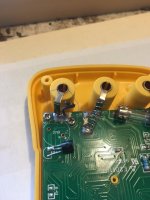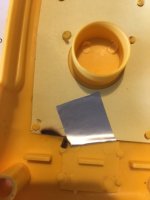had the lead connected to DC10A unfused input and I accidently checked the voltage on car battery which shorted out the multimeter (at least the unfused section) looks like it burned a piece of metal connecting the input from the circuit board. Is this repairable?
You are using an out of date browser. It may not display this or other websites correctly.
You should upgrade or use an alternative browser.
You should upgrade or use an alternative browser.
Blown Multimeter
- Thread starter VQLT
- Start date
Pictures please.
had the lead connected to DC10A unfused input and I accidently checked the voltage on car battery which shorted out the multimeter (at least the unfused section) looks like it burned a piece of metal connecting the input from the circuit board. Is this repairable?
Yes, solder a piece of bare solid copper wire across it where it burned to bridge the damaged connection.
As someone who used to design multimeters, I would say not very likely. Little handheld ones usually use a metal trace that's a specific length and width to get the right shunt resistance to measure the voltage across it, and hence, the current. Even if the part that burned was a connection to connect that lead to the shunt, the shunt likely has more resistance and probably would have been the first to burn up.
Edit: If you replace it with piece of wire, it might read something, but it might be way off.
Edit: If you replace it with piece of wire, it might read something, but it might be way off.
Innova 3300 Multimeter. 1st picture I drew circle around the piece of metal that burnt. I believe that gap between the bent piece of metal and the lead is where it blew. 2nd picture inside of lid, scorch mark from when it blew
Attachments
Even with fuse protection under certain conditions the meter's trash. Fluke fuses are over $10 apiece.
That burned part was the shunt. It's a bit iffy on finding a suitable replacement, since it's a fairly low, but specific, resistance. You could try replacing it with a piece of solid copper wire of the same gauge and length (assuming it's copper), but don't be surprised if the reading is off.
I would toss it and get a better one, its a $20 meter and IMO not worth the time or effort, as other posters have said it may not be accurate even if you get it to work. For $41 you can get something like this.
- Joined
- Nov 2, 2021
- Messages
- 1,116
Time for a replacement. I always use the freebie horror freight meter when doing low voltage work. Sometimes in a pinch to check line voltage. 
 many meters are a dime a dozen and just as accurate as the big $ meters. Just make sure is a true rms meter
many meters are a dime a dozen and just as accurate as the big $ meters. Just make sure is a true rms meter
Very few people measure voltages other than sine wave and DC. Average consumer doesn't need an RMS responding meter.Time for a replacement. I always use the freebie horror freight meter when doing low voltage work. Sometimes in a pinch to check line voltage.many meters are a dime a dozen and just as accurate as the big $ meters. Just make sure is a true rms meter
OP, you've learned the hard way, but be aware that an ammeter (or a multimeter when set to its ammeter function) should never be connected in parallel to the circuit being tested. An ammeter should only be connected in series.
Voltage is measured by connecting the meter in parallel, but never amperage.
Voltage is measured by connecting the meter in parallel, but never amperage.
- Joined
- Nov 2, 2021
- Messages
- 1,116
They could be had for $20-30 off Ebay.Very few people measure voltages other than sine wave and DC. Average consumer doesn't need an RMS responding meter.
I say toss it. There are decent ones for under $50. I have the $79 HF one. Well the similar model sold several years ago. One of 5 or 6 I have.
Knowing how to use one is important also.
I made a Heathkit DVM with nixie tubes for readout. Have not seen it in many years and I have moved twice so I assume it's lost for good.
Also nice to have is a clamp on AC and DC ammeter and a 4 wire ohmmeter.
Knowing how to use one is important also.
I made a Heathkit DVM with nixie tubes for readout. Have not seen it in many years and I have moved twice so I assume it's lost for good.
Also nice to have is a clamp on AC and DC ammeter and a 4 wire ohmmeter.
There are actually decent ones out there for not much money. Seems like lots of companies just slap their name on those made in China multimeters, I picked this one up for about $15 a few months ago. Now it's about $23. I guess inflation is real.
Similar threads
- Replies
- 3
- Views
- 1K
- Replies
- 11
- Views
- 1K
- Replies
- 18
- Views
- 2K
- Replies
- 37
- Views
- 3K


